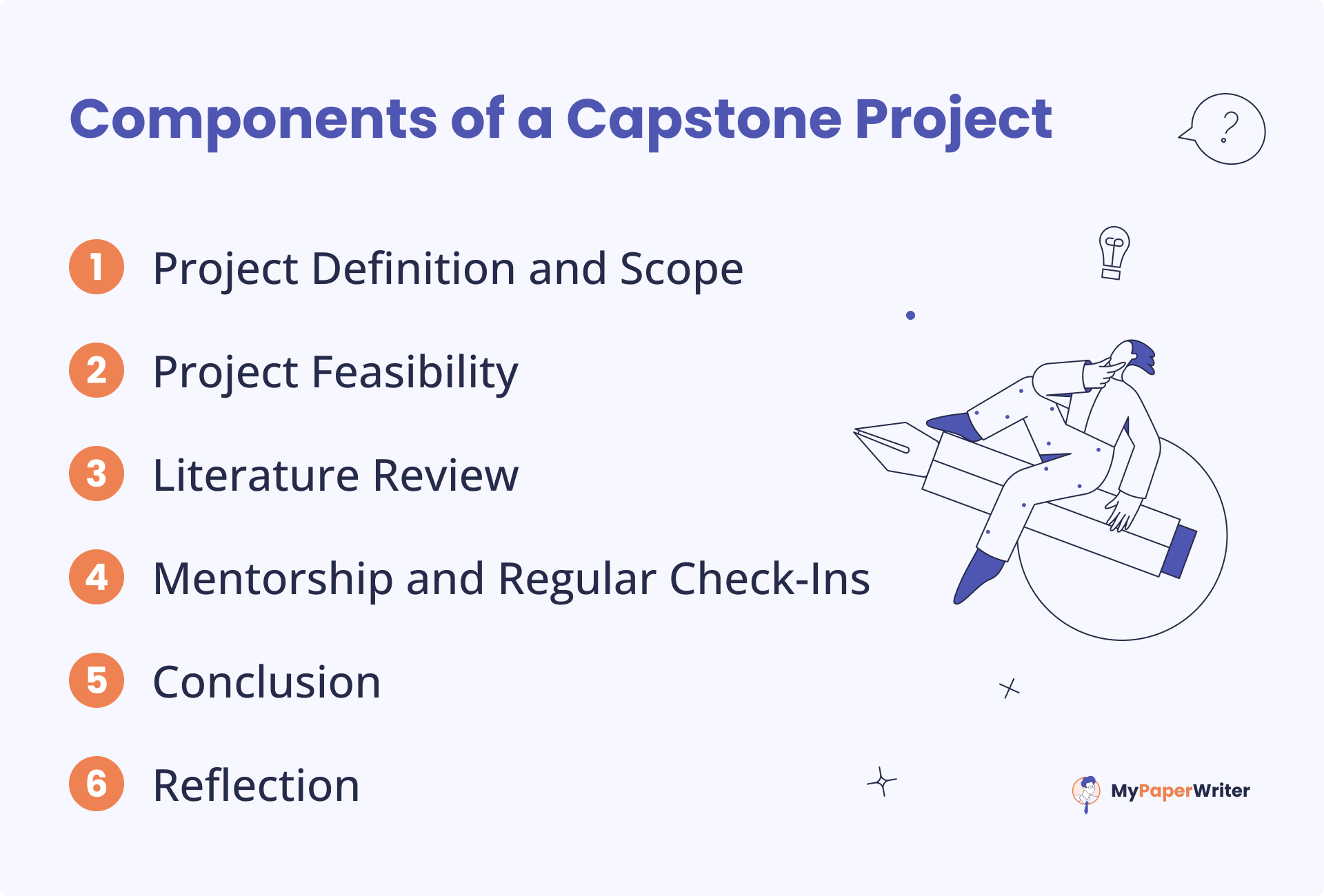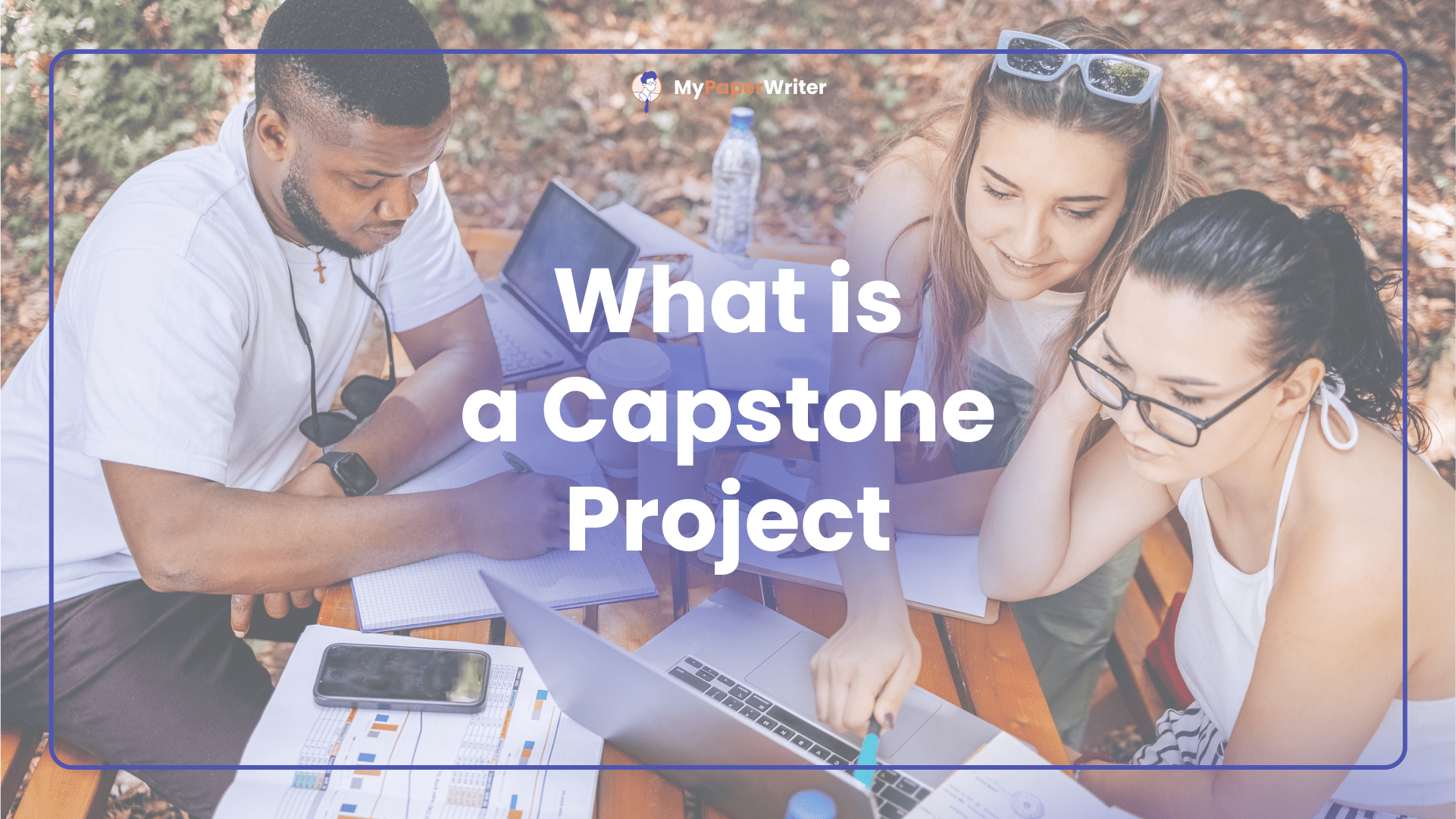At the end of your last term in college, you’ll be asked to complete a final project. These final assignments come in all shapes and forms depending on the topic and level of your degree. Capstone projects are a type of final project, but what makes them different is that they not only test your knowledge of a subject but force you to apply your knowledge to solve real-world issues.
This interdisciplinary approach to academics allows students to understand their area of expertise outside of the classroom setting, setting them up for success after graduation.
This type of final project, while an irreplaceable learning experience, is the source of anxiety among students. Tasks like these give students the opportunity to showcase all the knowledge they’ve accumulated over the course of their entire academic career, which can be extremely exciting, but also extremely overwhelming. And with the project’s somewhat open format, the number of directions students can take when approaching it can lead to choice paralysis, leading even the best students to feel stuck.
Do you have a big assignment coming up, but don’t know where to start? This article is aimed at students like you who are looking for that extra push in the right direction.
Table of Contents
What is the Purpose of a Capstone Project?
Students with final projects due often wonder to themselves what the point is. They discuss capstone project meaning and purpose with their peers, trying to wrap their heads around how they can best approach such a big assignment. But trust me when I say that projects like this are nothing to be afraid of.
In college, I was a prolific procrastinator. I left even the simplest assignments for the last minute. While I was (miraculously) able to maintain a good grade, my peace of mind and time management suffered. What I learned over time is that the best way to approach assignments is to do them right away. This “get it done” mindset is what I teach to my students as a tutor, and what I hope to pass on to you, the reader.
A capstone project writing service can remove some of the stress of writing by helping students plan, craft, and finalize their work. If you feel that you need professional help, try reaching out to MyPaperWriter. You’ll be matched with an expert academic writer who can give you one-on-one writing support.
However you choose to approach your project, the purpose is also to prepare you for the future by having you take part in hands-on learning, research, real-life problem-solving, and creative work. These sorts of projects and experiences can then be included in a student’s resume, setting them up for career success after graduation.
What are the Different Types of Capstone Projects?
Depending on what your professor has assigned, capstone projects can take the form of a paper, art portfolio, lab report, student film, and so much more. Unlike your average final exams, capstone projects give students more freedom and the opportunity to explore their personal interests, thus giving them the autonomy and creativity to choose their own adventure. These projects can be viewed as a checkpoint that demonstrates how far you have come in your academic journey, while also being a learning opportunity themselves.
So, let’s go over the most common forms of capstone projects and what you should keep in mind when approaching them.
Research Papers
This is the most common form of capstone project. Research papers identify gaps that exist in current academic writing and knowledge and ask meaningful questions that are then answered with certain research methods, such as conducting observations, experiments, surveys, interviews, and more to guide your reader to a specific conclusion.
Case Studies
For subjects that already have significant and direct real-world applications, this is another common form of capstone project. Case studies involve applying theories to actual scenarios, analyzing solutions, and discussing different approaches that could be used to address the scenario.
Creative Works
This format gives you the opportunity to express your creativity using skills you have learned throughout your academic career. Depending on the discipline you are studying, a creative works capstone project can take the form of a video, song, visual art or design piece, novel, short story, or script.
Field Placement Projects
Field placement projects offer you the opportunity to apply skills you’ve learned in school to real-life situations through fieldwork, internships, or mentorships. Through direct experience in a professional setting, you can learn new things that you would not have learned otherwise.
What are the Components of a Capstone Project?
When you’re up to your neck in capstone research, analysis, and writing, it’s so easy to focus on content alone and ignore everything else. But content alone can’t create a great capstone project.
Imagine you are handing your project over to an advisor or a panel of evaluators: the content may be brilliant, but if the document looks like a patchwork of different fonts, inconsistent spacing, and scattered citations, the impression is already soured. Therefore, how you format a capstone project is also of the utmost importance.
Having a good structure for your piece is also non-negotiable. The right structure puts your ideas together in a logical sequence, thereby letting readers go through your research objectives, methodologies, findings, and conclusions with ease.
Your capstone project requires much more than just good content. Let’s go over some of the most important components you should incorporate into your writing process and final project.

Project Definition and Scope
Always start your project with a defined scope and definition. This not only helps you complete the piece but helps your readers or viewers understand the project’s boundaries and know what to expect. It prevents your project from growing beyond its original plan, which may cause delays and burnout, and ensures that it answers the questions it is supposed to answer.
Project Feasibility
Perhaps the most important aspect of a capstone project is its feasibility. You’ll have the freedom to choose the exact topic of your project, but some topics are more difficult than others. Consider your topic carefully and ensure that you can realistically complete the task without burning yourself out.
Literature Review
A literature review is an integral part of a capstone project because it summarizes existing knowledge on your topic and identifies gaps in the field; thus, it helps you build upon existing research and contribute something new to your field with your work. Before starting your project, review the literature on your topic to figure out where your skills are most needed. The best projects build upon what has already been discovered. If you’re simply repeating information, you’re not doing it right.
Mentorship and Regular Check-Ins
From choosing the project topic to finding the right method, it is important to consult a mentor before you dive in. Mentors can provide guidance from their professional experience, which will help you make proper decisions about the project scope, methodology, and potential pitfalls to avoid. Expert guidance is integral to producing outstanding work.
Conclusion
The writing center at the University of North Carolina at Chapel Hill writes, “The conclusion allows you to have the final say on the issues you have raised in your project, to synthesize your thoughts, to demonstrate the importance of your ideas, and to propel your reader to a new view of the subject.” View your project as a story. You need the rising action, the climax, the falling action, and the conclusion that wraps all the information up.
Reflection
When all is said and done, reflect on how it all went down and what you would do differently in the future. Part of the capstone process involves reflecting on what you learned from the course, how the class project impacted you and others, and ways you can improve in the future.
What are the Best Capstone Project Writing Tips?
So, you’re sitting at your desk, fingers hovering over the keyboard, but you have no idea what to write. Sound familiar? According to “Alice” from Columbia University’s Go Ask Alice! blog, “The four main causes of writer’s block include psychological, motivational, cognitive, and behavioral reasons.” Alice then lists mood, fear of failure, and procrastination as leading causes of writer’s block.
When approaching a large writing project, addressing the psychological, motivational, cognitive, and behavioral aspects of getting yourself to write should be the first challenge you overcome. Figuring out how to keep going can be another challenge.
Here are four writing tips to take with you to avoid roadblocks.

Pick a Topic That Excites You
The worst mistake a student can make when starting their project is choosing a boring topic. Boring topics make it nearly impossible for you to find the motivation to sit down at your desk and write. When you choose a capstone topic that interests you, you’ll be excited to get to work. Make a list of the most interesting ideas, then narrow the list down until you find the best one for you.
Create a Detailed Outline
You need to create an outline that will define capstone project goals from the very beginning. Without a detailed outline, you’ll have no roadmap to look at when you lose your train of thought. When you finish writing a paragraph, you’ll look up and think, “Now what?” Those moments of doubt and confusion take you out of the zone. So, before you start writing, make sure you have a plan and have listed your capstone project ideas out clearly.
Manage Your Time Well
You can’t finish a capstone project in one night. Unless you use ‘buy thesis online’ services, your assignment is going to take days, weeks, or even months to complete. Once you get the assignment, make a schedule for yourself that leaves you time every day to work on it. You can give yourself long-term and short-term goals for weekly and daily time management.
Work With Other People
As John Donne wrote in Devotions, “No man is an island.” A project of this scale cannot be done alone. (At least not done well.) As a college student, you have access to professors, research institutions, TAs, and peers with expertise to help you and offer feedback. Outside perspectives are indispensable for writers. A conversation with someone may resolve your issue entirely and set you on a new path to success.
Getting Your Capstone Project Done – Final Words
Capstone projects provide students with the unique opportunity to showcase their expertise in a certain field of study. While this opportunity can be exciting, it can also prove to be extremely stressful, leaving some students saying, “I wish someone would write my paper for me.” If you’re one of those students, you may benefit from getting professional help from online academic writers like those at MyPaperWriter. But whether you get professional help or not, use your capstone project to develop your voice as an academic and make a mark in your field. The work you do now can affect the career path you go on later, so take your time, approach your work with diligence, and most importantly, have fun!

